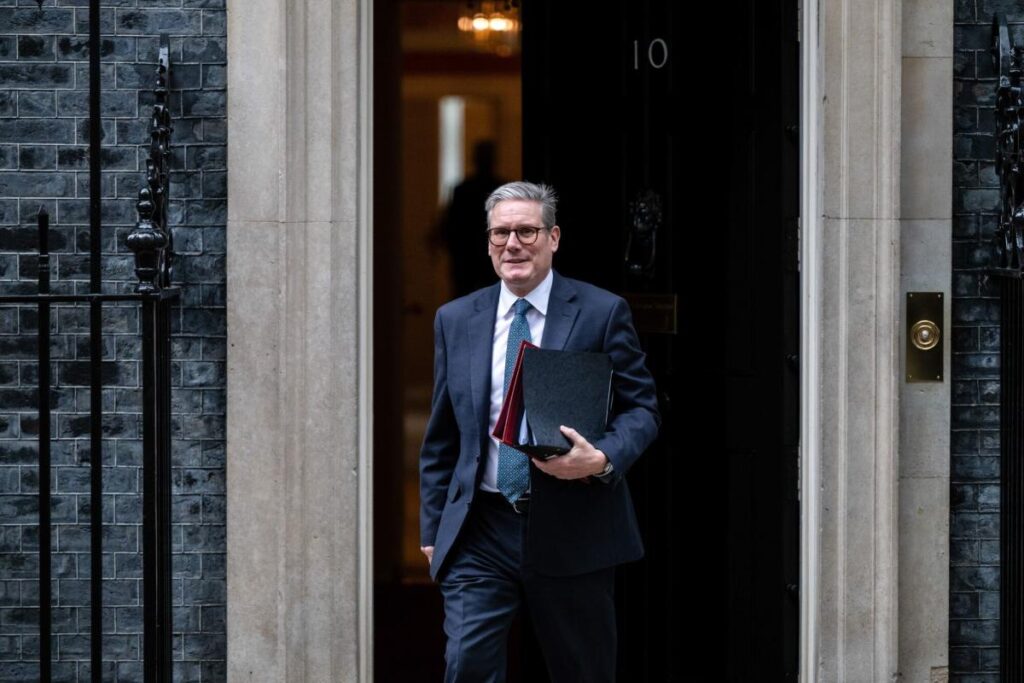Keir Starmer’s administration is facing a significant transition as he recently convened his new top team in Downing Street, marking a pivotal moment just as he approaches 100 days in office. While his demeanor was calm during the introduction of his aides, the underlying context suggests an urgent need for a course correction after a tumultuous start characterized by dwindling economic confidence, allegations regarding access to power, and steep declines in approval ratings. A strategic overhaul under Morgan McSweeney, Starmer’s newly appointed chief of staff, is underway, aiming to reposition Labour’s narrative towards a more dynamic and engaging approach as the government prepares a series of announcements intended to reassure voters about key areas such as the economy, healthcare, migration, and crime.
Amid critiques and declining popularity—evidenced by Ipsos’s report of a 13.5-point drop in Labour’s favorability—Starmer’s shift from Sue Gray to McSweeney illustrates his desire for a more agile leadership style capable of responding to the pressing issues faced by the electorate. This transition in leadership spots a deliberate pivot towards active governance rather than a defensive posture in the face of growing internal strife and public skepticism. According to insights from unnamed sources close to the administration, the new operation is designed to leverage data-driven strategies that resonate with voters, signaling a commitment to learn from past missteps and provide a clearer, more appealing message regarding the government’s policy goals and achievements.
Chancellor of the Exchequer Rachel Reeves has highlighted that significant economic challenges lie ahead, particularly with an anticipated harsh budget on October 30, which raises questions about the government’s ability to stabilize its political position swiftly. Despite the imminent difficulties, there is a recognition within Starmer’s camp that tangible improvements in governance must be demonstrated in the next phase of his leadership, suggesting a focus on minimizing infighting and emphasizes unity. A concerted effort will be made to sharpen the government’s narrative on external engagements, including economic growth, security, and immigration, while also heightening the visibility of key figures such as Health Secretary Wes Streeting to bolster public confidence in Labour’s capacity to tackle pressing issues.
Public sentiments indicate that voters are yearning for a government dedicated to rejuvenating the economy and restoring efficacy within the National Health Service. Moreover, the internal dynamics of Starmer’s leadership have begun shifting under McSweeney’s guidance, with an apparent reduction in the bureaucratic hurdles once imposed by Gray’s prior administration. The intention behind these changes is not only to enhance decision-making efficiency but to instill a deeper understanding among aides of their purpose in delivering results that matter to the electorate. McSweeney’s emphasis on pragmatism serves as a reminder that success hinges on meeting voter expectations and performing effectively in the political arena.
Nevertheless, skepticism about McSweeney’s role looms, with some claiming he shares culpability for the previous administration’s negative narratives concerning the economy. Observers are concerned that his ascent reflects rewarding those who previously critiqued Gray, questioning the wisdom behind such personnel decisions. Additionally, worries persist about the broader implications of Gray’s departure for Labour’s strategic relations, particularly regarding the European Union, wherein her experience had been deemed advantageous. This transition represents a risky gamble, as McSweeney’s lack of established connections might complicate Labour’s foreign relations amidst ongoing challenges. Yet, opposing perspectives within Labour maintain optimism regarding the potential for a restructured operative framework capable of confronting emerging challenges from political rivals, including the Conservatives and reformers.
With the upcoming contest for the Conservative leadership, analysts suggest that Starmer will benefit from a clearer contrast against a new opposition leader. Observers point out that without such a benchmark, evaluations of Starmer may be overly focused on his performance while in power. Labour must forge a narrative that transcends mere fiscal rectitude, providing a compelling vision for governance that encompasses NHS improvements and crime reduction over the coming years. Former Labour advisers emphasize that the party’s focus should not be confined to budgetary issues alone but should resonate with the public’s aspirations for tangible improvements in life quality and government accountability, reinforcing the necessity for effective delivery of services. Ultimately, the narrative crafted in the coming months will play a crucial role in shaping Labour’s future standing with voters and will test Starmer’s leadership capabilities as he navigates a fraught political landscape.

